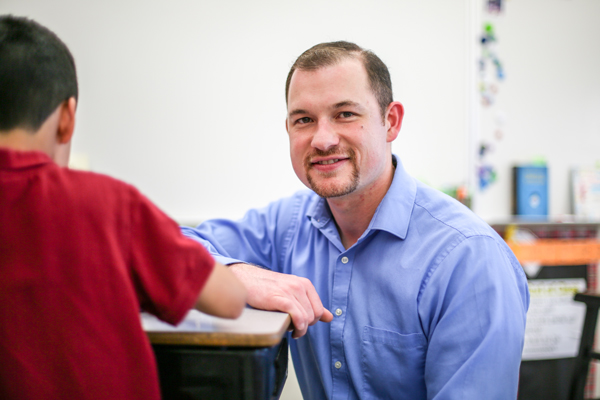The future of education is already here. Meet Thomas Arnett, a leader in educational research.
Thomas Arnett didn’t grow up dreaming of becoming an educational researcher. For a while, he thought he might follow in his father’s footsteps and become an engineer. He also worked construction jobs, studied economics and organizational behavior, and nearly majored in psychology, all on his path to finding the perfect fit. And then, after college, he spent two years as a middle-school math teacher with Teach for America. But that too wasn’t right, though he was getting closer. A business degree came next. It wasn’t necessarily a logical step for someone who would end up working in education or research, but for Arnett, business school and his time as a McGowan Fellow (class of 2013) were the perfect foundation for a career he could be proud of.
“Candidly, as a teacher, I really struggled,” Arnett shares. “I struggled because being a new teacher is hard no matter who you are. But I often felt that the challenges I was up against wasn’t just the lack of experience I had, it was with the way the system was set up.” With a degree from Carnegie Mellon University in hand, leadership training from McGowan, real-world classroom experience, and a deep desire to make change, Arnett was ready to use all he had learned to do work that would have a meaningful impact on social sector problems. His focus would be education. “I believed I could change the life trajectories of students, especially low-income students.”
For nearly 10 years now, Arnett has been doing exactly that by studying innovation and systems change in K–12 education at the Clayton Christensen Institute, a nonprofit, nonpartisan think tank. “Education, conventionally, is taking a group of students, all around the same age, and assuming they have more or less the same ability, and then you move them all through a set of teacher-directed set of experiences at the same pace, and hope they come out educated in the end,” says Arnett. “But the truth is that students end up moving differently through their education experience. The system wasn’t designed to accommodate true diversity of need or even be able to identify it to help teachers know what to do.”
Arnett has concentrated much of his work at the Clayton Christensen Institute on learning how to best change the current—and often failing—model of education, a system that is known for ranking and sorting students by metrics such as their GPAs and test scores. Instead, Arnett believes the focus should be on figuring out each students’ unique profile of talents, skills, and interests. “We have to help them fulfill their potential by helping them develop the attributes they need, the skills and knowledge they need, to go contribute in their unique way to the world,” he says.
In trying to disrupt the classic classroom model, Arnett is hoping to make individualized tutoring and other personalized learning experiences more widely accessible, as these are the spaces where children can often be seen for who they are—their gifts recognized and fostered. “I think there’s a new parent awareness of ‘we need something better for our kids.’ There are seeds of demand and seeds of new ideas that we’re going to see in the next 10 years that will likely gain traction over time,” he shares. Arnett is enthusiastic about the future of education, and his current research is informing superintendents, principles, and policymakers in how to create ideal conditions for forward-thinking models of education to take root and scale.
Arnett recently won the Digital Learning Collaborative’s Inaugural Research Impact Award, a reflection of his dedication to improving education and the student experience. The win was unexpected for Arnett, who remains humble even in moments of recognition and success. He explains, “My goal has always been to see education be transformed, see these new models of education become more widespread, more mainstream, and the award was a reminder that the things I’m producing is of value to the field. It is helping people map and navigate their efforts to improve education, and better serve students.”
Arnett’s path has never been more clear, and as he continues his work not just rebuilding education but also looking at larger social problems and trying—always trying—to make the world a better place, he stays grounded in many of the concepts introduced to him during his time as a McGowan Fellow. “To me, ethical leadership is conducting your life and your work in a way that is fair and honest,” he says. “I was in the class of 2013, which was the third cohort of McGowan Fellows. It was just a group of really good people with a deep desire to uphold high standards of ethics. There’s something valuable about being in that kind of community, with the expectations and visions it gives you for what you should aspire to. I continue to live by and model those values.”
This dedication to ethics and high moral standards is clear to anyone who knows Arnett and his work, and when in the near future we finally start to see education models shift to better serve students, we’ll also know who to thank.

